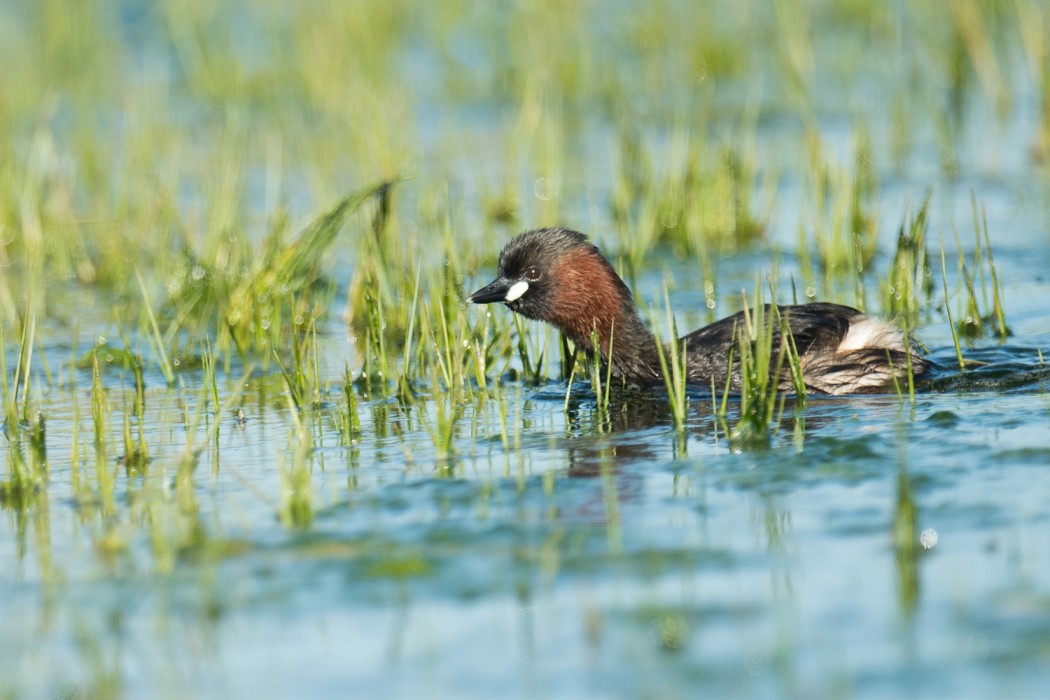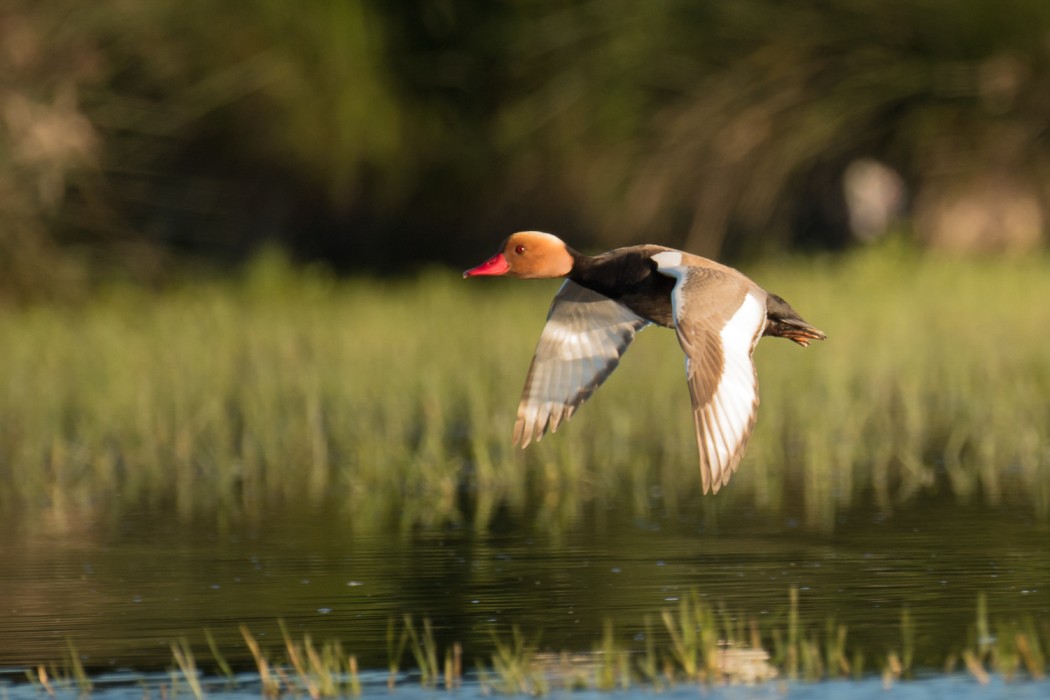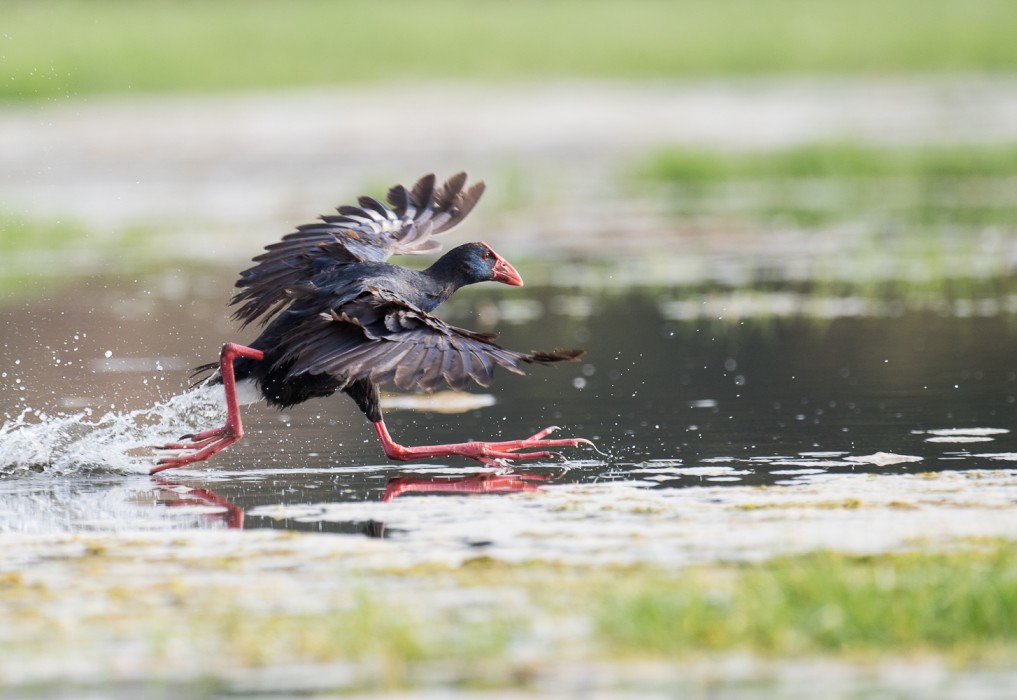During the hurricane season in the United States, migrating birds along the Northern and Central American coast often flee from the bad weather and head towards Morocco to make a stop-over.
"Some migrating birds, like the Dominican Plover, get here as they have been completely diverted and lost. They arrive tired after flying across the Atlantic Ocean," said Jean-Philippe Joseph Edouard, member of Morocco's Ornithological Group (GOMAC), during a bird census of the wetlands, or daya as it’s known in the Moroccan dialect, in Dar Bouazza, a village located 30 kilometers south of the city of Casablanca.
Here, wild vegetation meets the dunes of the Atlantic Ocean on a 44-acres piece of land that is now under threat from a duo of housing developers. The protection of this biodiversity haven, home to 800 species, is at the heart of a judiciary battle between the Moroccan state and civil society organizations.
"This is madness," said Youssef Chehbi, a Moroccan lawyer specialized in business law, who lives in a house overlooking the Dar Bouazza wetland. "Nobody can own a property that belongs to the public domain, like the sea or a river," he told Global Citizen.
The Dar Bouazza daya boasts 180 bird species, such as the threatened marbled duck, as well as 80 plant species. You can see here 20% to 25% of all Morocco's dragonflies’ species, half of its bird species and half of its amphibian species, he detailed.
During weekends, the place offers a getaway to early morning runners with their dogs. As soon as the sun is high in the sky, local families get together to picnic by the lake as children get excited to see water birds just a few meters away.
A winding main path in the forest leads to sand dunes overlooking the Atlantic Ocean.
Despite a sign reading “Forest of Oued Merzeg” – named after the neighboring village where part of the wetland is located – this haven of peace, little known from city dwellers, is getting increasing attention.
In the distance, the rhythmic sound of the ocean waves breaking on the shores contrasts with the roar of black SUVs parking on the edge of the forest, thereby denaturing the green landscape.
"This daya is a biodiversity hotspot in Morocco," Joseph Edouard told Global Citizen, as he buries his telescope into the grass to monitor bird species.
Besides being a critical stop-over for migrating birds crossing the Atlantic Ocean, the Dar Bouazza wetland plays fundamental environmental and social roles.
In a mostly dry North African country prone to water scarcity and extreme weather events, "such wetlands deliver a range of systematic services to mankind,” said Benoît Maire, another GOMAC member, during the bird census.
He explained that the freshwater springs that feed the Dar Bouazza daya flow continuously, even during dry periods.
In addition, during heavy rains, these wetlands act like a sponge: they soak up the water overflow and prevent flooding, he told Global Citizen.
 Jean-Philippe Joseph Edouard, a member of Morocco's Ornithological Group, has been monitoring species and collecting data on insects in the Dar Bouazza wetland every month for the past six years.
Jean-Philippe Joseph Edouard, a member of Morocco's Ornithological Group, has been monitoring species and collecting data on insects in the Dar Bouazza wetland every month for the past six years.
The pair have been monitoring species and collecting data on birds and insects in this wetland every month for the past six years. They have also discovered new species in Morocco, such as the Synema globosum spider.
"If we destroy this wetland along the coast, we will lengthen birds' migratory route, which will lead to fewer birds being able to migrate and, hence, a decrease in the bird population and, eventually, a possible extinction of the species," the French ornithologist warned, stressing that this phenomenon is exacerbated by global warming.
Along with other local organizations, Joseph Edouard and Maire are battling to safeguard the wetland in this former fishing village from being enveloped by the booming seaside town it’s becoming.
And it’s not alone. A 2019 report from the Intergovernmental Science-Policy Platform on Biodiversity and Ecosystem Services (IPBES) warned that 85% of the planet's wetlands are likely to disappear in addition to one million animal and plant species threatened with extinction.
Biodiversity and ecosystems are declining at an alarming rate due to population growth, agricultural practices and urban development, among other factors.
In October 2020, the Casablanca tribunal granted two real estate developers ownership rights of the Dar Bouazza ecological site after they submitted a formal request before the court to claim it as an agricultural land.
But instead they seized the opportunity to build housing for people keen to escape overcrowded Casablanca.
"Millions are at stake given the value of the land," said Maire, as he makes his way through the abundant vegetation.
"You just can't own the sand."
Following the court's ruling, a local district water and land agency submitted a request to add the wetland to the national land registry.
At the heart of this judiciary battle is an ambiguous decree set by the King in August 1995. It stipulates that "water resources may not be privately appropriated, with the exception of waters over which rights have been legally acquired."
 Youssef Chehbi, a Moroccan lawyer, shows the court's ruling granting real estate developers ownership rights of the Dar Bouazza ecological site, on his cellphone, on May 8.
Youssef Chehbi, a Moroccan lawyer, shows the court's ruling granting real estate developers ownership rights of the Dar Bouazza ecological site, on his cellphone, on May 8.
The protection of the daya has been a rallying call for the local community.
At the end of last year, a dozen Moroccan grassroots organizations, including scientists and academics, wrote a private letter to the King urging him to step in to protect the area, deemed a "national heritage" site.
Halima Bousadik, President of the Moroccan Wildlife Photographers Association, and one of the signatories of the letter, told Global Citizen that the Environment Ministry responded by saying that they had received a request from the royal cabinet to handle the case and “would take it seriously."
While, Morocco registered 38 sites of international importance, they do not include the Dar Bouazza wetland. In 1980, the nation adopted the Ramsar Convention, as part of a broader strategy to become an international leader in renewable energy – home to the world's largest concentrated solar farm in the Sahara Desert.
This international treaty, known as the Convention on Wetlands, promotes wetlands' conservation to achieve sustainable development.
Despite being a nest for endangered species and an important step-over in birds' migration route, the Dar Bouazza daya does not meet the criteria of the Rasmar's wetlands committee, Mostafa Madbouhi, Head of the Biological Diversity Division at Morocco's Environment Ministry, told Global Citizen.
Not protecting the Dar Bouazza wetland will contribute to the decline of nature in a continent where biodiversity is decreasing at an unprecedented rate, Moroccan NGOs argue.
It is estimated that Africa will lose over 50% of its bird and mammal species, as well as 20% to 30% of its lake productivity by the end of the century as a result of environmental overexploitation and degradation, according to a 2018 report published by the Intergovernmental Science-Policy Platform on Biodiversity and Ecosystem Services (IPBES).
As the sky gets cloudier in the daya, the members of Morocco's Ornithological Group, oblivious to the drops of rain that have started to fall on their telescopes, point to a reddish-brown ferruginous duck, a near threatened species.
The battle to classify the site as a nature reserve has been raging for years. As they wait for the King to make a decision, local NGOs aren’t losing hope that the daya will be preserved from urban development.
"Wetlands are jewels, they are oases of life," said Maire.
Note: Global Citizen was not able to get in touch with landowners to offer them a right of reply because only lawyers of the case have access to the case and the identity of the plaintiffs.



